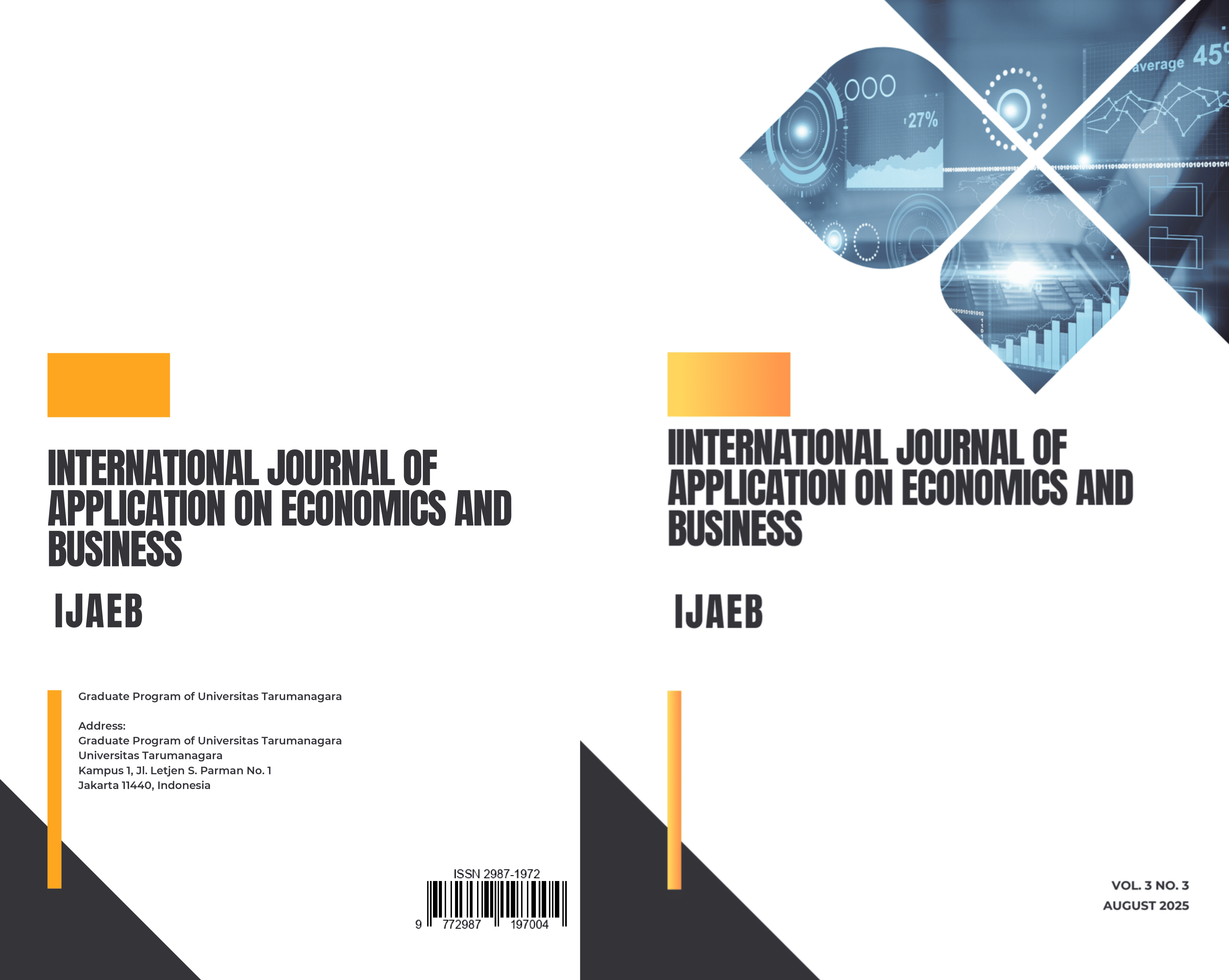THE INFLUENCE OF PROFITABILITY, INSTITUTIONAL OWNERSHIP, AND MANAGERIAL OWNERSHIP ON STOCK RETURN IN THE ENERGY SECTOR
Main Article Content
Abstract
This study aims to examine how stock returns in the energy sector listed on the Indonesia Stock Exchange (IDX) during the 2020–2023 timeframe are impacted by profitability, institutional ownership, and management ownership. With the aid of Microsoft Excel 2016 and SPSS version 25, multiple linear regression analysis was performed on secondary data taken from firm financial reports. The percentage of shares held by institutions is the basis for institutional ownership, the percentage of shares held by firm management is the basis for managerial ownership, and Return on Assets (ROA) is the basis for profitability. The findings demonstrate that profitability positively and significantly impacts stock returns, suggesting that more profitable businesses typically offer larger stock returns. The fact that managerial and institutional ownership have no discernible impact on stock returns, however, suggests that managerial shareholding and institutional investor participation have no direct bearing on a company's stock performance. This analysis suggests that while institutional and management ownership are not determining variables in predicting stock returns, investors should prioritize profitability when making judgments about energy sector investments.
Article Details
Section

This work is licensed under a Creative Commons Attribution-NonCommercial-ShareAlike 4.0 International License.
This journal provides immediate open access to its content on the principle that making research freely available to the public supports a greater global exchange of knowledge.
IJAEB by Graduate Program of Universitas Tarumanagara is licensed under a Creative Commons Attribution-NonCommercial-ShareAlike 4.0 International License.. Permissions beyond the scope of this license may be available at https://journal.untar.ac.id/index.php/ijaeb
References
Spence, M. (1973). Job market signaling. The Quarterly Journal of Economics, 87(3), 355–374.
Freeman, R. E. (1984). Strategic management: A stakeholder approach. Pitman Publishing.
Spence, M. (1973). Market signaling: Informational transfer in hiring and related screening processes. Harvard University Press.
Freeman, R. E. (1984). Strategic management: A stakeholder approach. Pitman.
Kieso, D. E., Weygandt, J. J., & Warfield, T. D. (2020). Intermediate Accounting (17th ed.). Wiley.
Elton, E. J., Gruber, M. J., Brown, S. J., & Goetzmann, W. N. (2017). Modern Portfolio Theory and Investment Analysis (9th ed.). Wiley.
Gillan, S. L. (2006). Recent developments in corporate governance: An overview. In B. E. Eckbo (Ed.), Handbook of corporate finance: Empirical corporate finance (Vol. 1, pp. 381–430). Elsevier.
Morck, R., Shleifer, A., & Vishny, R. W. (1988). Management ownership and market valuation: An empirical analysis. Journal of Financial Economics, 20, 293–315.
Jensen, M. C., & Meckling, W. H. (1976). Theory of the firm: Managerial behavior, agency costs, and ownership structure. Journal of Financial Economics, 3(4), 305–360.
Ross, S. A. (1977). The determination of financial structure: The incentive-signaling approach. Bell Journal of Economics, 8(1), 23–40.
Fama, E. F., & French, K. R. (1993). Common risk factors in the returns on stocks and bonds. Journal of Financial Economics, 33(1), 3–56.
Alabdullah, T. T. Y. (2018). The relationship between ownership structure and firm financial performance: Evidence from Jordan. Benchmarking: An International Journal, 25(1), 319–333. https://doi.org/10.1108/BIJ-04-2017-0065
Shan, Y. G. (2019). Managerial ownership, board independence and firm performance. Accounting Research Journal, 32(2), 203–220. https://doi.org/10.1108/ARJ-09-2017-0153
Kanakriyah, R. (2021). The impact of ownership structure on firm performance: Evidence from Jordan. Journal of Asian Finance, Economics and Business, 8(3), 13–23. https://doi.org/10.13106/jafeb.2021.vol8.no3.0013
Al Farooque, O., Buachoom, W., & Sun, L. (2019). Board, audit committee, ownership and financial performance – Emerging trends from Thailand. Pacific Accounting Review, 31(4), 636–659. https://doi.org/10.1108/PAR-10-2018-0078
Sembiring, R. (2020). Institutional ownership, managerial ownership, and firm performance: Evidence from Indonesia. Journal of Economics, Business, and Accountancy Ventura, 23(1), 1–10. https://doi.org/10.14414/jebav.v23i1.2284
Ratnawati, V., Sugiharto, T., & Sari, R. P. (2018). The effect of ownership structure on firm performance: Evidence from Indonesia. Journal of Business and Retail Management Research, 12(3), 100–107. https://doi.org/10.24052/JBRMR/V12IS03/TEOOSOFP
Vijayakumaran, R. (2021). Ownership structure and firm performance: Evidence from Chinese listed companies. Research in International Business and Finance, 55, 101331. https://doi.org/10.1016/j.ribaf.2020.101331
Hermiyetti, & Katlanis, M. (2019). The effect of managerial ownership and institutional ownership on firm value with profitability as a moderating variable. International Journal of Innovation, Creativity and Change, 5(4), 211–226. https://www.ijicc.net/images/vol5iss4/Hermiyetti_April_2019_Special_Edition.pdf
Nugroho, P. I., & Widiasmara, A. (2019). The effect of managerial ownership, institutional ownership, and profitability on firm value. Journal of Accounting and Strategic Finance, 2(1), 1–12. https://doi.org/10.33005/jasf.v2i1.34
Shan, Y. G., & Xu, L. (2019). Corporate governance and firm performance in China: The role of managerial ownership. International Journal of Accounting & Information Management, 27(4), 590–614. https://doi.org/10.1108/IJAIM-05-2018-0059

